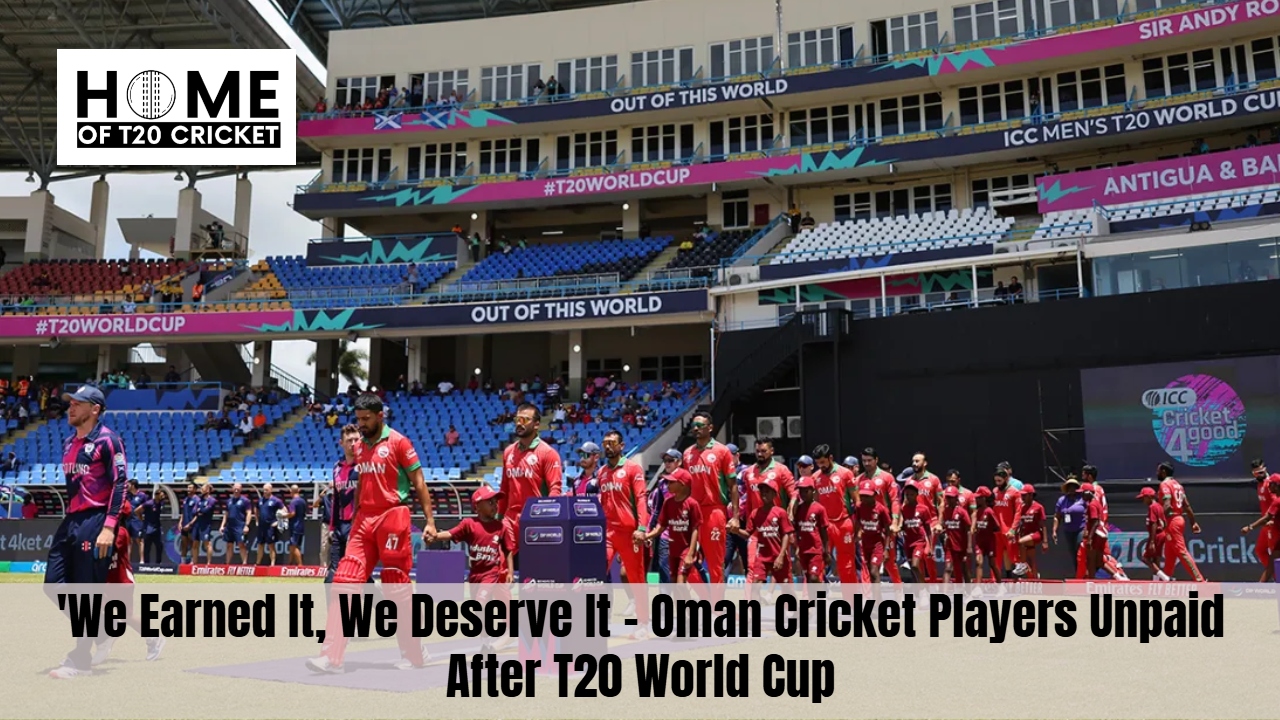Just one year after standing on the world stage at the ICC Men’s T20 World Cup, Oman cricket players now face a starkly different reality. For players like top-order batter Kashyap Prajapati and pacer Fayyaz Butt, the thrill of competing against global heavyweights like Australia and England has been replaced with financial uncertainty, career disruption, and forced relocation.
At the heart of this crisis lies a brewing scandal: Oman cricket players have not been paid their rightful share of the ICC’s $11.25 million prize pool from the 2024 T20 World Cup. Despite the ICC confirming that Oman Cricket received $225,000 as prize money for finishing in the 13th–20th bracket, players claim they never saw a cent.
“It’s been a complete collapse of trust,” Prajapati said. “Our lives have been upended. We’ve lost our contracts, our places in the team, and even the right to stay in the country.”
From World Cup pride to visa cancellations and silence
The rift began quietly, as players, unaware of their prize entitlements, learned from peers in Canada and Nepal that they had received partial payments from their respective boards. Encouraged to speak up, Oman’s cricketers raised the issue with management in September 2024 during a tri-series in Canada. But their concerns were brushed off.
“We were told to focus on playing,” Prajapati recalled. “There was no clarity, no timeline, just empty reassurances.”
When the squad attempted to take a collective stand before the Emerging Teams Asia Cup in October, threatening to sit out unless a resolution was offered, the situation turned confrontational. Players were reportedly warned they’d be replaced, and within hours, most of the squad was cut, told to vacate their hotels, and effectively exiled.
A glance at Oman’s matchday squad against UAE showed just how drastic the purge was; only two players from the T20 World Cup squad remained. Others, like Fayyaz Butt, had their visas revoked. “It ended my career,” Butt stated. “I’m unemployed now, and I had no choice but to leave the country.”
The Oman cricket players’ unpaid story points to a wider concern in Associate cricket: a lack of safeguards for players and little accountability for boards.
Why player protection still lacks teeth in global cricket governance?
Under ICC regulations, member boards must distribute prize money to players within 21 days of a tournament’s conclusion. Despite this, enforcement mechanisms are weak. The World Cricketers’ Association (WCA), which has advocated for Oman’s squad, revealed that late or partial payments are not uncommon in Associate cricket.
WCA CEO Tom Moffat highlighted the global implications: “In a sport trying to retain talent and stay relevant, non-payment in flagship events is damaging. Players shouldn’t fear speaking up.”
The WCA has proposed that the ICC deduct unpaid prize amounts directly from member board funding, but the player-led group acknowledges that the ICC, governed by its members, has limited authority to impose such financial penalties.
Prajapati voiced frustration not just with Oman Cricket, but with the broader system: “Why is there no safe platform for us? Why can’t the ICC guarantee we get paid for our performance on the world stage?”
With no players’ union in Oman and minimal legal protections, many players never knew they were entitled to any funds in 2021 either. According to WCA, some boards bank on this ignorance or seek to intimidate players from asking questions, offering partial payments as a pacifier.
The fallout has left Oman’s cricket in turmoil, with a gutted squad and players scattered across borders, trying to rebuild. Yet even in exile, they remain united in calling for justice and asking the cricketing world: Why are Oman cricket players unpaid, and who will step up to change that?
Also, see:
Celebration Turns Tragic: Fans Die During RCB Victory Celebration Outside Chinnaswamy

